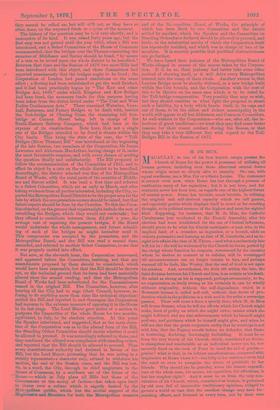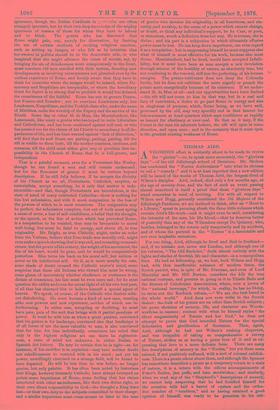M. DE MUN.
MACAULAY, in one of his best known essays, praises the Church of Rome for the power it possesses of utilising all human powers, including even those abnormal mental forces whose origin seems so closely akin to insanity. She can, with equal readiness, use a Mrs. Fry or a Sister Louise. The statement is correct even now, when Rome has lost through a process of ossification many of her capacities ; but it is not true, and for centuries never has been true, as regards one of the highest forms of mental power. Rome has trouble, much-trouble, in utilising the original and self-derived capacity which we call genius, and especially genius which displays itself in novel or far-reaching thought, or in political acumen of the highest and most far-sighted kind. Supposing, for instance, that M. de Mun, the Catholic Cavalryman just re-elected to the French Assembly, after his election had been invalidated for the use of Clerical influences, should prove to be what his friends anticipate—a man who, to the implicit faith of a crusader, an inquisitor, or a hermit, adds an oratory persuasive and burning as that of M. Gambetta, and an in- sight into affairs like that of M. Thiers,—and what a melancholy fate will his be l He will be welcomed by the Church he loves, petted by the clergy whose function he respects, reverenced by the enemies whom he desires to convert or to subdue, will be worshipped till unconsciousness can no longer remain to him, and perhaps succeed till he feels, like Wesley, that the seal of God is set upon his mission. And, nevertheless, the little rift within the lute, the faint division between his Church and him, is as certain as his death. No mind as strong as his is supposed, perhaps erroneously, to be, no organisation as finely strung as his certainly is, can be wholly without originality, without the self-dependence which in a Romanist layman is called self-will, without that desire of pro- duction which in the politician is a wish and in the artist a sovereign passion. There will come a time, a speedy time, when M. de Mun will dream dreams, when he will see efforts which his Church might make, lines of policy on which she might enter, causes which she might befriend, and see also achievements which he himself might perform, and guidance which he himself might give, and when he will see also that the great corporate entity that he worships is not with him, that the Papacy recoils before its defender, that Rome is hesitating, doubting, frowningly forbidding. It must be so from the very theory of his Church, which, considered as divine, is changeless and unalterable as an individual never can be, too securely fixed on the rock of Peter to need the aid of genies,— genius 1 what is that, in its loftiest manifestations, compared with inspiration as Rome views it?—too lofty in her mission ever to feel the need or even to recognise the virtue of gratitude to her friends. Why should she be grateful, when the utmost expendi- ture of the whole man, his means, his capacities, his affections, is but her simplest right ? And it must be so from the very con- stitution of his Church, which, considered as human, is governed by old men full of immovable traditionary opinions, obliged to govern a world so vast that the smallest change may have far- reaching effects, and fettered at every turn, not by their own ignorance, though the Italian Cardinals in rnrEcular are often strangely ignorant, but by their own deep knowledge of the mighty ignorance of masses of those for whom they have to labour and to think. The genius who has discerned that Rome might gain, say, merely for illustration, by limiting the use of certain methods of exciting religions emotion, such as setting up images, or who felt as by intuition that her swerve in politics should be to the democratic side, or who imagined that she might advance the cause of morals, say, by bringing the sin of drunkenness more conspicuously to the front, must convince old men satisfied with their system, dreading new developments as involving consequences not plumbed even by the endless experience of Rome, and keenly aware that they have to think for countries where the images would be missed, where De- mocracy and Scepticism are inseparable, or where the hereditary thirst for liquor is so strong that to prohibit it would but debauch the consciences of the faithful. Rome has not to govern France, but France and Ecuador ; not to convince Londoners only, but Londoners, Neapolitans, and the Turkish clans who, under the name of Milldam, unite the worship of the Papacy and the service of the Khalif. Some day or other M. de Mun, like Montalembert, like Lamennais, like many a genius who has hoped to unite Liberalism and Catholicism, and has been cautioned against self-zeal, or who has pressed too far the claims of his Church to ascendancy in all de- partments of life, and has been warned against "lack of discretion," will find that he and Rome are parting, parting, parting, till the rift is visible to them both, till the mother censures, cautions, and menaces, till the child must either give way or proclaim that im- possibility in the Church of Rome, that he is full-grown, and independent.
That is a painful moment, even for a Protestant like Wesley, though he can found a sect and still remain undamned ; but for the Romanist of genius it must be torture beyond description. If he still fully believes, if he accepts the divinity of his Church as we all, Protestants, Catholics, sceptics, or materialists, accept something, be it only that matter is inde- structible—and that, though Protestants are incredulous, is the state of mind of many cultivated Catholics—there is nothing for him but submission, and with it meek resignation to the loss of the powers of which he is most conscious. The resignation may be perfect, the submission complete, but out of both must spring a sense of error, a loss of self-confidence, a belief that the thought, or the speech, or the line of action which has provoked Rome, is a temptation to be resisted, that may be favourable to moral well-being, but must be fatal to gnergy, and above all, to true originality. Mr. Bright, as true Catholic, might, under an order from the Vatican, believe that Free-trade was morally evil, might even make a speech showing that it was evil, and recanting economic errors; but the power of his oratory, the weight of his movement, the fire of his heart, would be gone, and he would be comparatively powerless. Man turns his back on his moral self, but seldom or never on his intellectual self. Or if, as is more usually the case, some shade of doubt crossed the Catholic orator's mind, some suspicion that these old Italians who thwart him must be wrong, some gleam of uncertainty whether obedience or resistance is the dictate of conscience, his fate must be even more sad ; for he must question the utility and even the moral right of all his own best past, of all that has charmed him to believe himself a special agent of heaven. We speak, of course, of the Catholic who doubts with- out disbelieving. 110 must become a kind of new man, wanting alike new powers and new experience, neither of which can be forthcoming. In either case, accepting or doubting, he must have pain, pain of the sort that brings with it partial paralysis of power. It must be with him as when a great painter, convinced that his genius is for landscape, convinced also that landscape is of all forms of art the most valuable to man, is also convinced that for him, for him individually, conscience has ruled that only in the highest religions art can there be righteous- ness, a state of mind not unknown in either Italian or Spanish Art history. He may be certain that he is right—as, for instance, if his sacrifice is in expiation—may have neither doubt nor rebelliousness to contend with in his mind ; and yet his power, unwillingly exercised on a strange field, will be found to have departed. He will be less than he was before, no longer genius, but only painter. It has often been noted by historians that Kings, however intensely Catholic, have always betrayed on points some impatience of Rome, some feeling that her claims interfered with other sacrednesses, like their own divine right, or their own direct responsibility to God—the thought a King loses last—or their own duty to the subjects committed to their charge ; and a similar impatience must come sooner or later to the man of genius who devotes his originality, in all heartiness, and sin- cerity, and worship, to the cause of a power which cannot change, or doubt, or think any individual's support, be he Czar, or poet, or statesman, worth a deflection from her way. He is human, she is divine ; and his part is a subjection in which ultimately effusive power must be lost. He can keep down impatience, can even regard it as a temptation ; but in suppressing himself he must suppress also what of himself is most effective for his work, because also most divine. Montalembert, had he lived, would have accepted Infalli- bility, but it must have been as man accepts a new revelation through science of the hostility of nature, as absolutely true, but not conducing to the renewal, still less the perfecting, of his human energies. The potato-cultivator does not deny the Colorado beetle, but he does not cultivate the more eagerly or preach the potato more energetically because of its existence. If we under- stand M. de Mun at all—and our opportunities have been limited —the rift will not come to him in that way, but in a zeal and fury of conviction, a desire to go past Rome in energy and also in singleness of purpose, which, Rome being, as we have said, governed by the old, may very speedily end in that lament for lukewarmness at head-quarters which saps confidence as rapidly as lament for obstinacy or over-zeal. Be that as it may, if the Count is the man his admirers believe, the rift will open in some direction, and open soon ; and in the certainty that it must open is the greatest existing weakness of Rome.



































 Previous page
Previous page